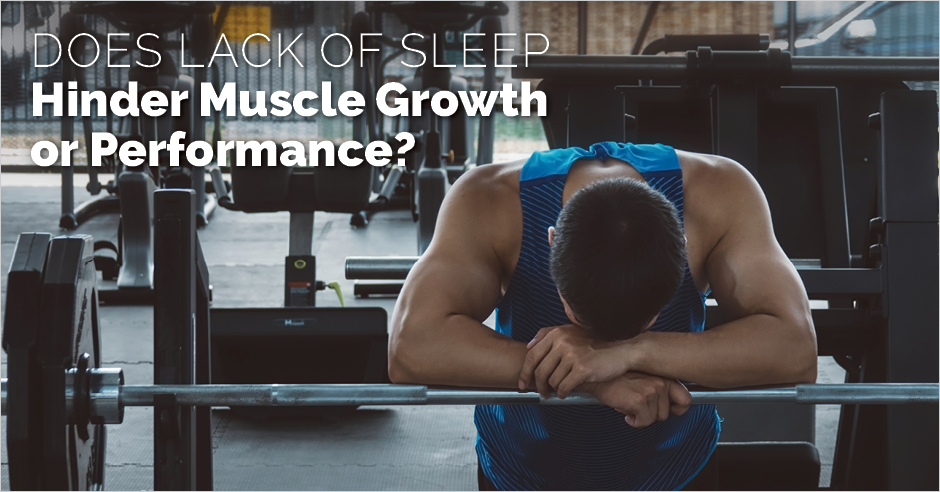From ISSA site: (https://www.issaonline.com/blog/index.cfm/2018/does-lack-of-sleep-hinder-muscle-growth)
How Does Sleep Affect Muscle Growth?
Glucose is a type of sugar that is stored within the body and used for energy. It is, in fact, the only kind of sugar that the body can break down for energy. Any other kind of sugar that we ingest is broken down into glucose before our muscles can use it for energy.
During sleep, blood glucose gets stored in the muscle as muscle glycogen. While glucose exists in other locations in the body (the blood and liver), muscle glycogen is a preferred location because it produces more energy than when glucose comes from the blood.
When you don’t get enough sleep, you don’t get maximum replenishment of muscle glycogen.
Human growth hormone (HGH), on the other hand, is one of the primary compounds that allows muscles to recover and grow. Among other functions, our bodies need it to actually use the amino acids present in the protein that we eat. As it happens, the time when the bloodstream is flooded with the stuff is – you guessed it – during sleep.
Without a good quantity and quality of sleep, the body simply cannot do these things well.
You need to understand that by consuming a combination of protein and carbohydrates (what bodybuilders call “mass fuel”) within 30 minutes before and after a resistance training session, they will stimulate an even greater release of HGH during sleep.
Shrinking Sleep Time = Shrinking Muscles
It’s not only that getting enough sleep helps muscles grow. Without adequate sleep muscle mass decreases.
A study in 2011 examined how sleep deprivation affected muscle gains and recovery. The study followed individuals who were on a strict sleep schedule for 72 hours. During this time, one group was allowed 5.5 hours of sleep; another was allowed 8.5 hours per day. All individuals followed a calorie-regulated diet.
What researchers discovered was that the individuals who slept only 5.5 hours had 60% less muscle mass at the end of the study, while those who slept 8.5 hours had 40% more muscle mass.
Obviously, we can see the powerful effect that sleep has on muscle recovery and growth.
Poor Sleep, Poor Performance
According to a 2008 study by Dr. Bert Jacobson, lack of sleep will hinder energy levels and leave us susceptible to mood swings. You might not think that “mood swings” are something we should be concerned about. However, there is enough research showing that our emotional state can directly affect our athletic performance, that it merits consideration.
Proper sleep is vital to help your clients perform optimally during training sessions, boost endurance, and enhance their mindset for the best results. In the end, all of this leads to better and faster muscle growth.
It May Be Time for a New Mattress
The same study also showed that a newer mattress helps people sleep better, which in turn boosts energy levels during weight training sessions. Individuals who got seven to eight hours a night on a newer mattress were more likely to participate in more physical activities. As you can see in the graph below, sleeping on a newer mattress correlated with much higher levels of activity.
Summing Up Sleep
Poor sleep means poor energy and probably a poor attitude. Chances are that this will translate to a sub-maximal effort, poor technique, and overall poor performance. Ultimately, this means your clients will experience sub-optimal muscle growth.
Most people – trainers, bodybuilders, athletes, and average gym-goers – overlook sleep as one of the pillars of a proper training regimen. With busy lives, getting by with just a few hours of sleep is the norm for many people – but it won’t lead to maximum muscle gains.
Tips for Proper Rest
#1 – Avoid high-intensity activity just before bed.
Performing high-intensity activities gives the body a boost of energy. Therefore, it is important that these kinds of activities be completed no later than three hours before bedtime. Otherwise, the subsequent energy-boost is likely to get in the way of a good night’s sleep.
Do not forget to factor in any other high-intensity activities that are part of your clients’ lives outside of the gym.
#2 – Stay on a good sleep schedule.
Though you may think you are getting the same quality of sleep by going to sleep late and waking up later, this is not true. These types of patterns tend to interfere with the body’s natural 24-hour cycle (also called the circadian rhythm).
It really is best for us all to go to sleep and wake up at similar times every day.
#3 – Drink a protein shake before bed.
The body has a tougher time controlling the breakdown of protein during sleep. This is problematic for muscle growth because our bodies must break down proteins into their constituent amino acids before they can recombine them to make new muscle tissue. Protein shakes are usually composed of protein in forms that are quickly and easily broken down, so downing one of them before bed can make this process a lot easier on the body.
Sleep…It matters!!!

